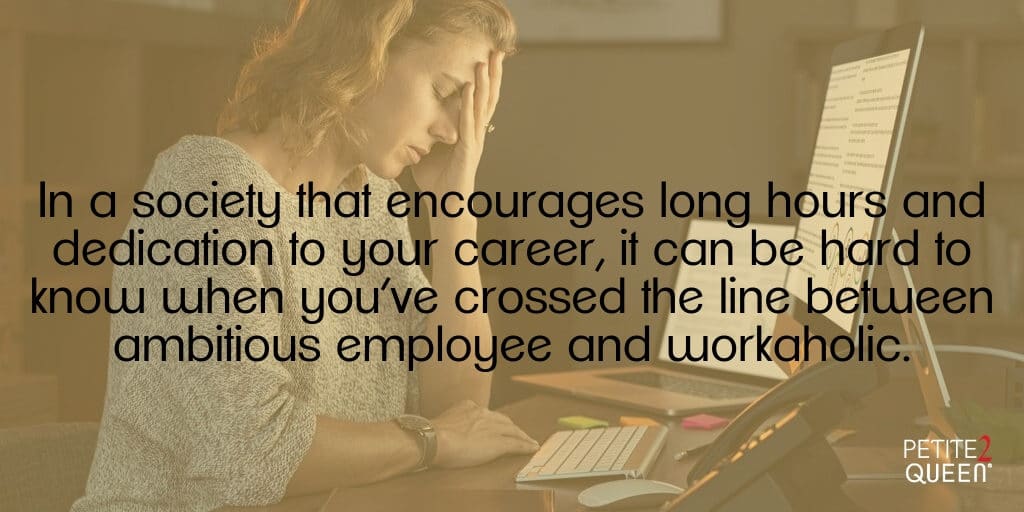Are you working hard… or working too much? In a society that encourages long hours and dedication to your career, it can be hard to know when you’ve crossed the line between ambitious employee and workaholic. While the former suggests goal-driven hard work in the name of career success, the latter is an unhealthy addiction to work. A workaholic is a person who compulsively works long hours, someone who cares too much about work at the detriment of other aspects of their life. It isn’t so much that workaholics want to keep working… it’s that they feel a need to do so.
In a workaholic’s mind, there’s always more to do, but they don’t distinguish between necessary productivity and unnecessary productivity. Even weekends and vacations aren’t seen as days of complete rest; workaholics will compulsively work even then. Work-life balance doesn’t exist in their world. The focus is always their job.
Are You a Workaholic?
According to a 2016 study by Project:Time Off and GfK, more than previous generations, millennials display traits of “work martyrdom,” or workaholism. Moreover, a higher percentage of millennials think it’s important to be viewed as a workaholic.
With so many workaholics among us, you may be wondering if you fall into that group or are simply a hard worker. Not sure if you’re a workaholic? Here are 6 signs to watch out for:
- Workaholics tend to be controlling and have difficulty delegating tasks to others.
- They neglect other parts of life. Relationships, hobbies, and even health take a backseat as work takes up all of their time.
- They may turn other aspects of life into work. For example, they make a hobby into a business.
- A workaholic may lie to others about how they spend their free time or why they need to work so much. They make excuses and act like it’s not a problem.
- They feel anxiety if they can’t be productive. For example, they may panic if they can’t get internet access to check their email. Once they’ve completed their to-do list, they may invent new things just to keep busy and feel productive.
- They don’t draw a line between necessary productivity and unnecessary productivity. Whatever they’re doing, they need to feel like they’re accomplishing tasks to be checked off from their to-do list.

We live in a world where there’s always something to do, and it further compels workaholics to continue working. Many of the boundaries we once had are now gone. You’re always connected, and thus, feel that you should always be working – or at least keeping busy. In some ways, technology has encouraged endless productivity, no matter where you are. Understand that technology doesn’t make a person a workaholic; however, it does make work tasks more accessible to workaholics.
The Dark Side of Workaholism
Workaholism may sound like great way to achieve job success and excel in your career, but if anything, the reverse is true. Workaholics tend to take on so much work that they can’t handle it all. They frequently aren’t team players, and the extensive workload they place on themselves can leave them disorganized. Furthermore, working so much is detrimental to their health and work performance.
Workaholics are at higher risk of feeling stress, anxiety, and depression. The endless hours can manifest in headaches, stomachaches, and high blood pressure. They are more likely to be overweight and develop health issues related to obesity. Burning out is a major threat, as working that much simply wears down the body. These health effects lead to lower productivity, worse concentration, and lower chances for promotions or raises. They simply aren’t working as optimally as their non-workaholic colleagues.
All of these symptoms point to the need to work less. Unfortunately, workaholics refuse to take time off. They can’t bring themselves to take breaks, enjoy their weekends, or spend vacation time away from their professional email and phone.
Japan, one of the few countries with a more workaholic culture than the United States, has a word that encompasses the concept of working yourself to death. Karoshi translates as “death from overwork.” Indeed, workaholism has major health effects, and it’s a serious issue. It must be combated in order to live a balanced, healthy life.
Regaining Work-Life Balance
Ending an addiction – no matter the drug of choice – is hard. Workaholics must take steps to get their life back on track. The first step is recognizing the issue; the second is deciding to fix it. Once you’ve done so, plan to ween yourself off of your work addiction gradually. Take baby steps towards achieving work-life balance.

How can you get started? Try these 6 tips to regain control:
- Give yourself hard limits, deadlines, and boundaries. If your schedule says you work until 5:00 pm, stop working at 5:00 pm. If you’re going to take time off for vacation, commit to it! It may help to find ways to enforce these schedules. I myself decided to attend classes at my local gym which begin at 5:45 pm. In order to get to the class on time, I must stop working by 5:05 at the latest. That’s a hard stop that forces me away from my desk.
- Don’t bring work home with you or out with you. Stop checking your phone while you’re with family, eating a meal, or watching a movie. Don’t talk your family’s ears off about work. Unless they directly ask you about your job, keep work-talk to a minimum.
- Think about how you can set technological boundaries. This is an important one, but you have to evaluate what works with the job you have. If you can, delete your work email on your phone. Put your phone on silent during evenings, weekends, and vacations. Minimizing the alerts can help keep your mind off work.
- Give yourself positive reinforcement for focusing on other things. If you spend time with your family, reward yourself. If you focus on a hobby for an hour, reward yourself. Find ways to train your mind to want these other things more than work.
- Talk to your manager about your workload and securing better work-life balance. If you’re a manager, delegate some work to others. Collaborate with your co-workers. Find ways to get work off your plate and free up your time. Most employers will be understanding and work with you to overcome your workaholism.
- Consider talking to a therapist or counselor about your workaholism. Remember, this is a serious issue, and you shouldn’t expect to cure yourself. A professional can give you the tools you need to limit or end your addiction.
Curbing your workaholism will be a process, and it will likely take months or years to regain a sense of work-life balance. Gradually decrease your work obsession as you shift focus to other aspects of your life. Know that even if you’re not on 110% of the time, you will still be a valued, effective employee with career success. But also realize that you need time to enjoy yourself – your relationships, hobbies, and leisure time matter just as much. Take those breaks, enjoy your weekends, and take a relaxing vacation. You’ve earned it. With awareness, support, and commitment, you can and will overcome your workaholism.
Resources
- “Workaholism: Signs, Symptoms & Treatments”
- “Understanding the Dynamics of Workaholism”
- “How Being a Workaholic Differs from Working Long Hours — and Why That Matters for Your Health”

Amanda Whitbeck is Vice President of Operations at Petite2Queen. Since earning her master’s degree in Global Entertainment & Music Business from Berklee College of Music, Amanda has played key roles facilitating growth at start-ups. She’s also worked in diverse sectors of the music industry, from live events promotion to entertainment journalism. She brings her expertise in music business, writing, and website development to Petite2Queen.

